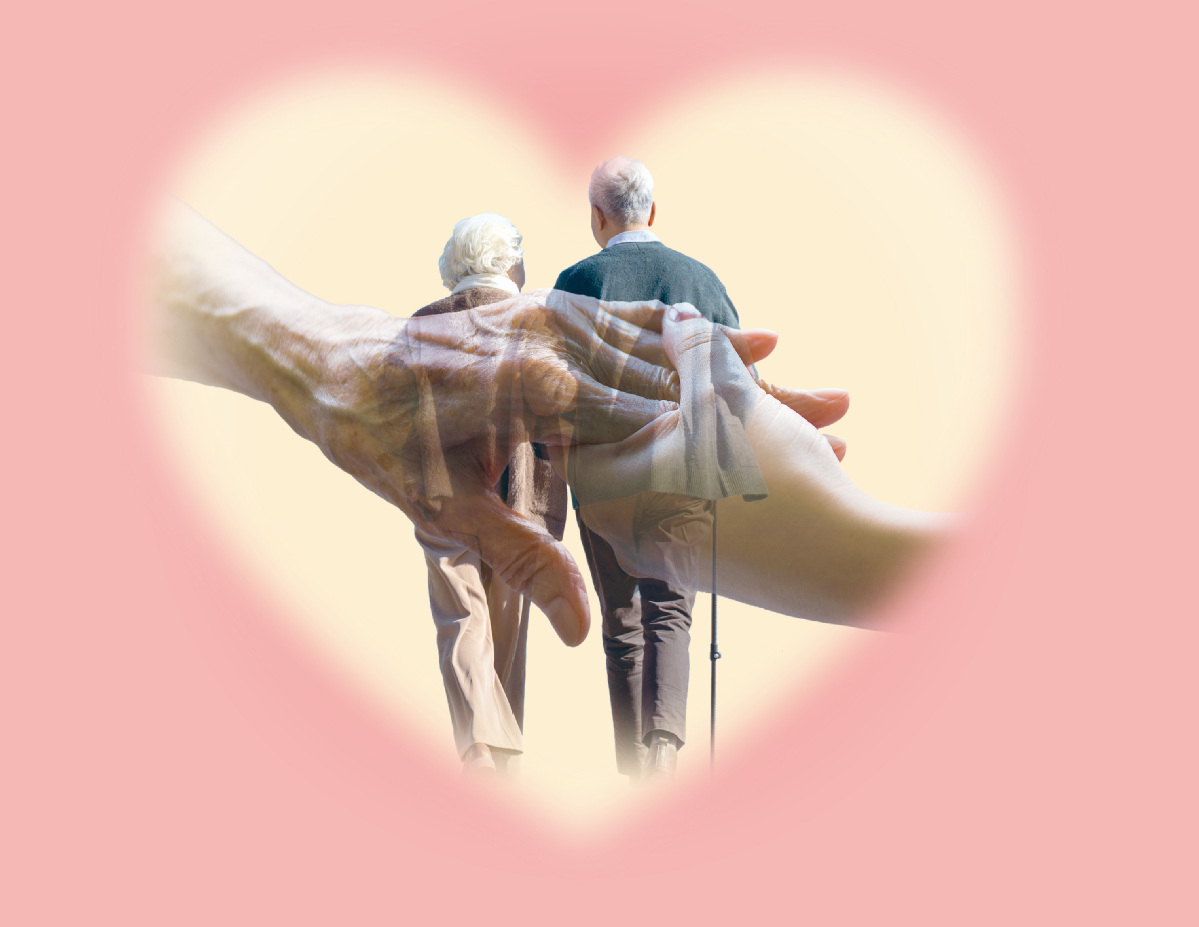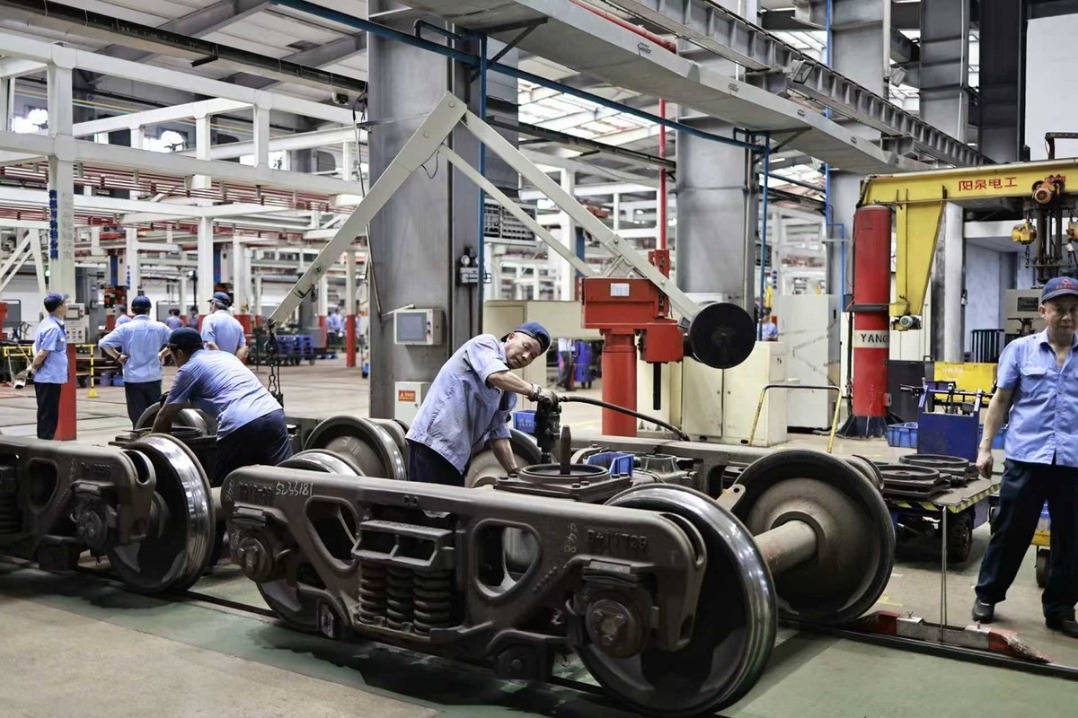Families face realities of dealing with old age depression
Children seek help on ways to address parents' cognitive decline, improve understanding


At the age of 74, Wang Youlin had never imagined he would face the debilitating grip of depression.
His life, once filled with laughter, adventure and the joy of watching his children grow up, began to unravel quietly in the months following his retirement. A formerly active man, he had been a basketball coach, shaping young minds and building lasting friendships with his students.
But over time, something changed. The first signs were subtle. Wang, who usually got up at six in the morning, began to sleep later and later.
His appetite dwindled, and the meals he once enjoyed now seemed like chewing sawdust. He would sit at the table, staring at his plate, unable to muster the energy to eat.
Days blurred into each other, and the vibrant man who had once tackled the world with enthusiasm now spent hours in silence, his thoughts weighed down by a fog he couldn't shake.
Wang's family began to notice the changes. His daughter, Wang Lin, who lives and works in Beijing, recalls the transformation with a heavy heart.
"It wasn't just the lack of energy," she said.
"My dad used to tell jokes, laugh at old movies, and even dance around the house when he was in a good mood. But one day, it all stopped."
Wang Lin, 43, works for an advertising company and lives in Beijing. Her father, mother and older brother live in her hometown of Jinan in Shandong province.
"I usually go home once a month as Jinan and Beijing are close. I remember when I first saw my father staring out the window. His face was blank and his eyes had lost their sparkle. Once standing at an imposing 1.9 meters, he was a towering figure. But his frame seemed to have withered, leaving him unusually thin and fragile. And that's when I knew something was wrong," she recalled.
Over time, her father had withdrawn from the activities he once loved. Reading, fishing, and cooking became burdens.
He refused invitations to family gatherings and would often sit alone in his favorite chair, a cup of tea growing cold beside him.
"He seemed lost," Wang Lin said. "It was like we were watching him disappear in front of our eyes," she said, adding the hardest part was not knowing how to help him.
At first, the family chalked up his lack of energy and sleep disturbances to the natural decline that accompanies aging.
But when her father started to refuse food, and retreated into long periods of silence, Wang Lin became worried. His body grew frail, not because of physical illness, but because he had no interest in eating.
Global problem
After months of watching her father deteriorate, she insisted on taking him to the hospital in Beijing. The diagnosis was a shock, he had a major depressive disorder.
"I never expected that my father would be diagnosed with depression. Some of my colleagues suffer from the illness but they are young, in their 20s or 30s," said Wang Lin.
At the hospital, she saw many young people accompanying their parents who had similar symptoms, though the reasons for falling ill can be very different.
Depressive disorder, or depression, is a common mental health condition that can happen to anyone, according to the World Health Organization.
It is characterized by a low mood, and loss of pleasure or interest in activities for long periods of time. This is different from regular mood changes and feelings about everyday life.
Globally, an estimated 5 percent of adults suffer from depression, the WHO said. An estimated 3.8 percent of people experience depression, including 5 percent of adults — 4 percent of men and 6 percent of women — along with 5.7 percent of those older than 60.Approximately 280 million people in the world have depression, the WHO said.
In China, 19.05 percent of elderly people are in a mild state of depression, and 12.17 percent experience moderate to severe depressive symptoms, according to the 2023 Blue Book of China's Mental Health released on Oct 10, World Mental Health Day.
Depression is often characterized by persistent feelings of sadness, loss of interest, and fatigue, and differs significantly in older adults, said Yin Dongqing, a psychiatry specialist and doctor at Beijing Anding Hospital Capital Medical University, which is also the National Medical Center for Mental Disorders.
It frequently manifests alongside physical symptoms, such as chronic pain or cognitive decline, making diagnosis challenging. Anxiety disorders, on the other hand, involve excessive worry, fear, and physical symptoms such as restlessness and rapid heart rate.
For seniors, these conditions often coexist, creating a dual burden.
"There are many reasons for senior people to suffer from depression and anxiety disorders," Yin said.
"For example, retirement, the death of loved ones, and physical decline can trigger profound feelings of loss. With children grown and friends passing away, many seniors face loneliness, which exacerbates mental health issues."
Support measures
Yin opened an account on the social media platform Xiaohongshu to discuss depression. To his surprise, it was mainly used initially by young people, many of whom shared stories about parents suffering depression and anxiety, and are seeking help.
"Families often become the unsung heroes in the battle against these disorders. The most important thing is to approach these disorders with empathy and understanding. Aging doesn't mean suffering. With the right care, our elders can find joy again," Yin said.
Li Chun's mother, Wei Fengzhi, struggled with anxiety, which gradually worsened over time. Wei had always been a cautious woman, but after a minor car accident a few years ago the 70-year-old's anxiety escalated to debilitating levels.
"At first, she just started worrying about the smallest things — 'Did I turn the stove off?' 'Are you sure the doors are locked?' But then, the worries grew bigger. She even became afraid of leaving the house. It was like her world became smaller and smaller," Li explained.
Wei's anxiety took over every aspect of her life.
She feared for the safety of her children and grandchildren, calling them multiple times a day, worried that something bad might happen to them. She avoided social gatherings, fearing that being away from home would expose her to danger.
Li, who had always been close to his mother, found herself caught between supporting her and trying to live his own life. "It felt like no matter how much I reassured her, it was never enough. She would always fall into panic, unable to calm down," he said.
A psychologist was consulted, who gave Wei coping strategies to deal with her anxiety, but the process was slow. "It was exhausting, both for her and for us," Li admitted. "We didn't know how to help, and we felt helpless. But now, I see a glimmer of the woman she used to be."
Worrying outcomes
Mystery headaches had plagued 75-year-old Mr Liu, who prefers using only his family name, for years.
His son Liu Yi had taken him to almost all the major hospitals in Shanghai, as well as some in Beijing, and consulted with specialists in headache disorders. However, the doctors always diagnosed that Mr Liu did not have a problem.
After taking his father to the hospital so many times, Liu Yi started to think his dad might be "making a fuss "and seeking attention from his children by pretending to have physical discomfort.
However, one expert suggested they try the geriatric psychiatry clinic, and Liu Yi decided to give it a try.
His father underwent tests and the results were a surprise.
"Although my father is usually introverted, his emotions have always been stable. It turns out that his depression was caused by anxiety, and it had already led to physical symptoms," Liu Yi said.
While the family had finally discovered the cause of their father's headaches, the revelation was accompanied by guilt.
"After my mother passed away a few years ago, I should have paid more attention to my father's mental health. I never imagined that depression was so close to us," Liu Yi said.
After the diagnosis, Liu Yi urged his father to open up about his feelings, which was a challenge for a man who is usually reserved.
Liu Yi said his father told him that many of his old friends had passed away, and he felt an unprecedented level of anxiety. However, loneliness scared him more than death.
The son said his father told him: "After your mother left, I felt an emptiness in my heart. The house became so quiet that it made me anxious, and I often needed medication to sleep."
After discussions with his wife, Liu Yi decided to bring his father to live with him and his family.
"Medication is one aspect, but what's more important is to spend more time with him, encourage him to go out and socialize more," he said.
"Every year, we plan family trips, and we make sure to include my father. I believe that with his active cooperation in treatment, and our support, he will be able to overcome his depression," Liu said.
Often misjudged
Han Xiaole, director of the geriatrics department of Beijing Huilongguan Hospital, said compared with younger people, the elderly's mental health issues are more subtle and often overlooked or misjudged.
"Relatives, related institutions, and even the elderly themselves tend to focus more on physical diseases, neglecting mental health issues. From our research, we found that very few elderly people are aware of their mental health problems and seek professional help proactively," Han said.
He added that, "As we face an aging society, it is essential for various sectors to work together to ensure the psychological needs of the elderly are seen and addressed."
For many senior people, mental health issues such as depression and anxiety are still stigmatized, Han said.
In previous generations, mental illness was not openly discussed, and there was a significant cultural taboo surrounding seeking help.
The belief that emotional struggles should be kept private or managed on one's own is still ingrained in many elderly people, especially those who were raised in times when mental health was often seen as a sign of weakness or moral failure. This can lead seniors to ignore their symptoms or downplay them to avoid being labeled as "weak" or "crazy".
Many families dismiss signs of depression or anxiety in their elderly relatives because they assume it's a natural response to the inevitable changes that come with aging.
For example, a loss of interest in activities, sleep disturbances, or withdrawal from social interactions might be attributed to the aging process rather than signs of depression.
"Senior people may be reluctant to seek help for their mental health due to a variety of reasons. For example, many older adults are concerned about becoming dependent on others or losing their independence," Han said.
"Some seniors may not even recognize that they are suffering from depression or anxiety. They may attribute their feelings of sadness, hopelessness or worry to age-related issues, or, assume that such feelings are unavoidable. This lack of awareness can prevent them from seeking treatment."
According to Yan Xue, a doctor in the psychology department of Guang'anmen Hospital China Academy of Chinese Medical Sciences, traditional Chinese medicine has advantages in treating mental disorders.
The integration of Chinese and Western medicine can improve efficacy, treat both the body and mind, and help prevent relapses. Treatments such as Chinese herbal medicine, acupuncture, and moxibustion are all effective, she said.
"Dealing with the reality that your parents are getting older and facing illness is undeniably challenging. It's particularly hard to deal with mental illness," said Yan.
"With the right treatment, understanding and support not only from the families but also from the society, these conditions can be managed, and recovery is possible. Only then can seniors face the future with the hope and dignity they deserve."






































